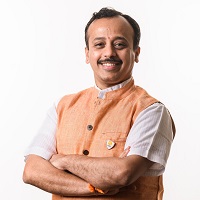
A member of the Founding Team of the Chanakya University, he currently holds the positions of the Director, Communications, and Director, Centre for Indian Knowledge Systems at the Chanakya University. He is a co-founder of Indica Yoga, a platform that offers authentic, immersive and transformative yoga experiences and training. He holds a PhD degree on psychological insights in the Vedas from Pondicherry Central University, besides Masters in Sanskrit, English, Yogic Science and Applied Psychology. Further, Dr. Vinayachandra had the fortune of being trained in rigorous traditional Gurukulam education in Sanskrit and Indian Philosophy with a focus on Yoga and Vedanta at Veda Vijnana Gurukulam, Bangalore, for six years.
Dr. Vinayachandra is a dedicated teacher who has travelled across the world conducting courses, lectures and workshops on a unique blend of Yoga, Psychology and Sanskrit. He has been a guest faculty/resource person at various Universities and Yoga Associations in Belgium, Switzerland, Germany, Israel, China, Ireland; Italy, France, Singapore, and the USA.
Dr Vinayachandra brings with him nearly two decades of rich experience in the domains of research, teaching and policy formulation owing to his varied engagements. He was a visiting faculty at the Department of Contemplative and Behavioural Sciences at Sri Sri University, Cuttack, Orissa. He has served as a Senior Consultant to the Committee to Draft the National Educational Policy under the chairmanship of Dr. K. Kasturirangan set up by Ministry of Education, Govt. of India; Director of Veda Vijnana Shodha Samsthanam, a Bangalore-based research centre dedicated to Samskrit and Shastric studies; he has taught or conducted research at several other universities or institutions.
His publications include a report on standardization of Yoga Terminologies for WHO; Perspectives on Indian Psychology, a book co-edited with Dr. Anuradha Choudry, and Happiness: Indic Perspectives, another co-authored book. In addition to his academic interests, he is passionate about working with children and youth and is involved with several cultural and service organizations in this regard. He has also curated and organized many festivals, conferences, workshops and camps on the themes mentioned earlier.
Abstract of the lectures
Sanskrit and the Essence of Yoga Tradition & Practice
Never before has the practice of Yoga been so popular. With a modest beginning as a discipline of personal and spiritual growth in the villages of India, today it has reached every corner of the world. Yoga has touched and transformed millions of lives in recent times. According to a survey conducted in 2017, there are about 200 million Yoga practitioners in the world of which at least half of them are of Indian origin either living in India or abroad. The number of practitioners in US alone was estimated to be around a staggering 55 million in year 2020!
All these facts make it amply clear that Yoga is a living tradition with a long history of a few thousand years in the unfolding of the Indian civilization. Though Yoga could mean many things to many people, it is a broad term for a variety of practices that are guided by a set of principles united in spirit and purpose. Its interpretations could easily vary from simple relaxation techniques to the experience of profound realizations while many equate it with physical postures. Furthermore, the fact that practising Yoga has many other benefits and advantages for one’s healthy living is neither unacknowledged nor overstated. It must also be noted that at no point of time was the larger perspective of the spiritual goal of Yoga lost.
In this context, we will examine some key texts, frameworks, concepts and terminologies that inform the philosophy and practice of Yoga. These elements are not only essential but also imperative in any discussion, teaching and finer understanding of Yoga. From the text of Yogasutra to the names of asanas, much of the literature in available only in Sanskrit. And, as far as the deeper appreciation of Yoga and its principles and practices are concerned, Sanskrit is considered to be the lingua franca of Yoga.